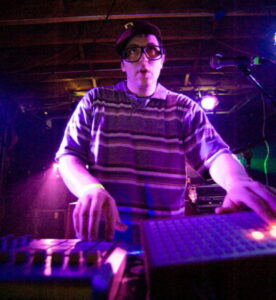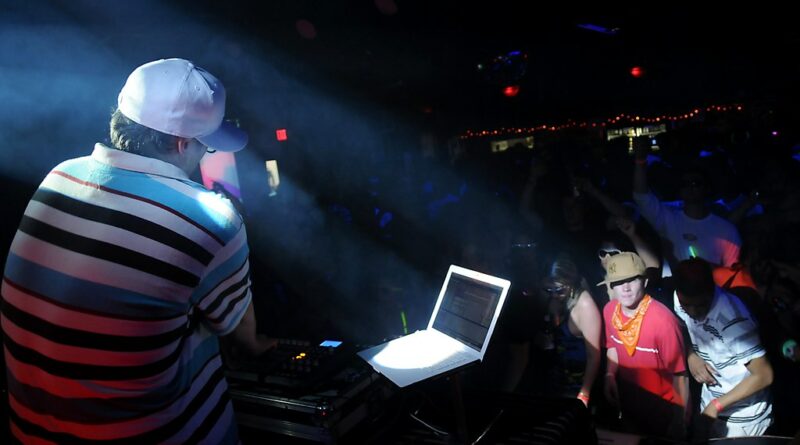cover photo: Roger Gupta
originally published on JamBase
Derek Vincent Smith has started a fire. As Pretty Lights, the producer-wunderkind has embarked on a mission for world domination. Releasing two full-length albums online, both totally free, like a slow, churning, smoldering blaze, the phenomenon began to spread. By Thanksgiving of 2008, it had built to a five-alarm inferno. Filthy breaks, glitchy broken-beat, crunkadelic juno-bass and ethereal soundscapes wrought with a kaleidoscope palette of emotions had taken the ever growing massive by storm.
The mind of Derek Vincent Smith is a myriad of boom-bap, jazzy daydreams, tech-step nightmares, computer turntablism and manic beat mining. While his choice samples, drum breaks, melodies and composition are really medium fare, it is how he applies these elements that separates Pretty Lights from the proverbial pack.
Beginning with 2006’s inviting Taking Up Your Precious Time, which was initially downloaded 5,000 times, the number reached 50,000 on the heels of his ambitious sophomore effort, the album that set off the explosion. A two set, 26-track monster, Filling Up The City Skies triumphantly announced Smith’s vision as more than just fun on a Mac or head-nodders for the crew cipher. This indeed was artistic vision, a manifest destiny.
For both albums, Smith enlisted a variety of styles and influences while tapping into different genres, although the core Pretty Lights sound has remained throughout. The producer’s double-disc Filling Up The City Skies maintains laid-back, introspective vibrations, working well-laced jazzy horns and psychedelic guitars over lush, erotic atmospherics. The songs are often strange amalgamations of styles, where tracks begin and end somewhere near the same point, with a strolling down-tempo drum track, programmed synth/keyboard effects and cloud-formed, slowly unfolding, dub-influenced bass lines.
Part of what makes each song a different experience is the direction of effects in layering the aural emotions. In the age of Ableton, Fruity Loops and the Mac-book selector, a new frontier of turntablism and production has risen. Smith is a beatsmith at the forefront of this movement. Despite his prodigious talents and incredible rise to fame, the Pretty Lights project is of humble bedroom beginnings.
Growing up, Smith learned the basics on bass and flute, but as he reached adolescence and beyond, hip-hop became his passion. His Ft. Collins, Colorado high school crew competed amongst themselves to arrange the hottest beats using the constantly evolving computer technologies. Today, his set-up doesn’t include any wheels of steel, but instead a laptop and a device that remains the secret to his illness, the Monome 128. Hovering over a grid of countless buttons and knobs used to manipulate and interface with prerecorded tracks, Smith is the master of this domain.
“I really haven’t had any musical training at all in the traditional sense. Everything that has to do with music that I know, I taught myself, from the instruments I play to all the recording gear and software I use,” says Smith. “I started making hip-hop beats in high school, but my production style really started to develop when I began acting as audio engineer/producer for the bands I played in through the years. Then, eventually I worked at a pro recording studio as a self-taught engineer/producer. Something about making hip-hop beats while also producing records for bands and working with live musicians helped to forge my own style of production.”
Too often, sample-based producers are not respected by traditional artists, as they borrow pre-recorded efforts and use those sounds to create a veritable collage of others’ work. In its inception, simplistic samples, or ‘jacks,’ gave the concept/process of sampling a bad name, particularly amongst the generations of musicians that originally recorded much of the music being raided. Nearly a quarter century later, the practice of sampling and hip-hop production, has been revolutionized into an art form. It begins with meditative, focused methods of digging or mining through vinyl in search of inspiration or muse.
“I’ve never spun a record onstage in my life,” Smith admits. “I’ve definitely developed a number of methods when it comes to finding the right pieces to make up a good PL track though. For example, when I go digging for vinyl at a record shop or a flee market or even a garage sale, there’s usually a massive amount of albums to sift though, so it’s all about getting a feeling or a hunch from each record and learning to trust those hunches.”
What exactly might pique that curiosity or internal hunch?
“I look for printing style [matte or gloss], visual aesthetic, color palette, musician lists and what instruments they play,” says Smith, “and basically, I form a snap judgment about each one as I go. Most get passed up, but the others get a listen on the battery powered turntable.”
Smith’s passion and process in his production create what are indeed compositions; in the world of digital turntablism anything and everything can be flipped. Chopped samples, programmed drums, and layers of sonic interplay allow producers to play the role of culinary artist, and the distinction that this is indeed original composition is not lost on Smith. His fervent belief in the process is evident. When all is said and done, the completed work is a canvas of masterful efforts, a road trip of feelings and sounds.
That is the beauty and allure of Pretty Lights’ music. One moment they are introspective and thought provoking and the next minute may touch your heart. A brief, wicked aural attack of dub-step juno-bass may overwhelm the listener for a moment, only to quickly seduce them with the emotionally drenched “Maybe Tomorrow.” Just when the vibes get smooth and controlled, an adrenaline-fueled “More Important than Michael Jordan” provides a spastic sonic orgasm. The feel-good fun of “Hot Like Sauce” gives way to the even spicier “Solamente.” The transitions are endless and continue to amaze. For sample-based music, this really seems a new frontier of artistry. This is an original sound and definitive style, as in not borrowed but developed.
“One thing I’ve run into a lot is people that immediately judge artists who sample as music thieves without enough of their own creativity to make good music on their own,” says Smith. “Now, with some producers, I’d say that might not be far from the truth, but I strive to always use samples in a way that brings new life and feeling to them. For example, my whole sampling style is based on combining several samples from different records, genres and decades, that, when made to work together, can create completely new emotions and styles. For me, taking many different samples that are in different keys and tempos and making them work together beautifully is where the difficulty lies and a huge amount of the potential creativity exists in my production style.”
When Smith does play a song from another artist, he doesn’t just drop the jam and let it ride, nor does he simply rock a remixed version of the established song. Instead, in the spirit of the great Madlib or dearly departed J Dilla, Smith chops, alters, and completely reworks the song. It is often only somewhat recognizable, a reinterpretation that also harks back to the transitional arrangements jazz musicians would employ when playing established popular music.
Case in point is a Pretty Lights live mainstay “Regulate,” the classic G-Funk anthem recorded by Warren G. and Nate Dogg. “I completely remade ‘Regulators’ with the original vinyl samples, and added a lot of synths and newer production techniques,” explains Smith. “That’s just fun for me, to find the same records that Warren G used and remake the same beat but in my style.”
Another peculiar choice yet undeniably hot PL live jam is the 1993 hip-hop club banger “Rumpshaker” by Wreckx-N-Effect, with its rugged and rumbling bottom end, repetitive chant and intoxicating sax loop. Again, Mr. Smith comes thru with an inventive and effective interpolation of this textbook panty-dropper. One cannot escape the fact that the architect of this song, Teddy Riley, is a production legend in his own right and acted as Mr. Miyagi to a young Pharrell Williams’ Daniel Laruso.
But Smith doesn’t stop there. Another production peer, Diplo, is responsible for the Grammy winning M.I.A. track “Paper Planes,” and like a mad scientist Smith concocted an epic mash-up with the Wreckx-N-Effect cut. “As far as ‘Rumpshaker,’ I would always get that song and ‘Paper Planes’ stuck in my head at the same time because of the same lyric (‘all I wanna do…’) in the choruses, so I absolutely had to hear those cuts mashed up. I might eventually take it a step further and work in Sheryl Crow’s ‘All I Wanna Do.’ I basically love to remix/re-create tracks from my past that I either loved or are reminiscent of some time in my life.”
Pretty Lights is Smith’s baby, his vision. However, one of the principle reasons the project is exploding with jam-centric types and becoming a sought after quantity on the festival circuit is their live performances. Smith steps his game up, delivering the goods with the assistance of live percussionist Cory Eberhard‘s relentless, metronomic beats, which provide an organic complement essential in this sub-genre. The pair combines stop-on-a-dime quickness with improvisational elements often lost on electronic artists.
“We’ve actually developed a system of sign language where I can conduct how it’s going to go and still communicate it to [Eberhard],” says Smith. Like James Brown, Smith can motion his hand and the result may be a switch to an off-beat, a skip-the-snares and just play high-hat eight notes thing, which drops into jungle rumble madness or goes into a breakbeat. “We can take the music to places we haven’t gone before, but he’ll still know where we’ll be moving to. It’s a method of improvising where we can stay on the same page.”
Watching Smith and Eberhard perform is entertaining, too. The drummer is wild with animated motion, flailing limbs and careening banter, while Smith is hulking, meditative, manning the production equipment with a leering intensity, his body swirling in motion with extreme rhythmic velocity, creating maximum torque.
And Smith is keenly aware of his perpetual groove.
“If I could get a taller table it would be a lot less hunch. I love seeing an artist really get into the music they’re performing, and really that’s all I’m doing. I need to have the stage volume loud as hell to really get into the cuts like I like to, and when the audience responds and feed me more energy, I get that much hype behind my table,” says Smith. “When I play a real hype soulful track with a vocal sample that really hits me and means something to me, I can go fucking nuts. I’ve done it before. That’s what it’s all about though, feeling the music and letting it channel through you. What my body does is just a by-product of that flow.”
The rise has been quick but Smith was ahead of the times even before his first show. He put his debut album online as a free download before Radiohead popularized the idea, and Filling Up the City Skies has already been downloaded nearly 70,000 times in the nine months since its release. On the heels of this frenzied ascension, Smith took the show on the road.
Music Matters’ “BALLER’S BALL” last Thanksgiving weekend, in Athens, Georgia was a coming out party of sorts, a bomb whose reverberations torched the Southeast. But, the unassuming Smith knew he had truly arrived the night they dropped a relentless aural assault on the city that never sleeps. Deep in the Bowery, in a historic ballroom where many a prodigal child had plied their trade, Smith and Eberhard firmly and proudly planted the Pretty Lights flag.
“Ah, the Bowery Ballroom. That was a gig I won’t ever forget,” says Smith. “It’s hard to describe the feeling of selling out my first headlining show in the most wicked awesome city on the planet. Something about playing in NYC just feels really special to me, and the venue as well as the energy from the crowd that night was so on point.”
In an amazing display of shooting stardom, Pretty Lights has gone from a relative unknown to a touring act in constant demand. Their recent itinerary betrays the arc of an artist building a whirlwind buzz throughout this great land. Peep game: Pretty Lights has already played Austin and Dallas, One-Eyed Jacks in New Orleans during Jazz Fest, and staged a veritable homecoming at Ft. Collins’ Aggie Theatre with Lyrics Born, all just this past spring. Smith and Eberhard have also gigged in Tallahassee, Florida, Athens and Atlanta, GA, both North and South Carolina and San Francisco. This summer Pretty Lights will run the festival gauntlet, making stops at Bonnaroo, High Sierra, Rothbury, Forecastle and Camp Bisco, among others. “It’s completely taken me by surprise,” Smith says. “I’m still astonished by it. I’m just really grateful for it.”
“Being able to make a living as a musician is what I wanted more than pretty much anything since I bought my first bass guitar in 8th grade. I endured many, many years of financial struggle, living week-to-week, and sometimes even being looked down at as pursuing adolescent and foolish dreams. So, I couldn’t be happier that I am finally getting some recognition and am able to live comfortably doing what I love,” offers Smith. “It has all happened so fast though, and the biggest way in which that has affected me day-to-day is in the adjustments I’m having to make in the way I write and create new music. Relentless touring can be very exhausting and often leaves very little time to focus on writing new material. It’s a delicate balance, and I guess I’m still trying to find an approach that really works for me. The new PL album, which is on the brink of being released, was for the most part created during the limited time between shows, often in airports, airplanes, hotels and greenrooms.”
It was the otherworldly “Finally Moving” that first caught the ear of this writer and became his winter season’s theme music, and it’s safe to say a PL tune is just as comfortable in the bedroom as it is in the club. This erotic, utterly sensual composition is the perfect marriage of down-tempo with smooth, sultry, melodic transitions, tensions and releases. The fact that this is baby making music is “just fine by me,” according to a chuckling Smith.
And what about the name Pretty Lights?
“I saw this old poster for a 1966 Pink Floyd New Year’s show that advertised the lights, and kind of started using that name before I was even trying to bring a light show,” Smith admits. “Now that things are picking up, I definitely want to make it a big multimedia experience.”
It’s a safe bet that at the pace Pretty Lights are rolling, a big experience is indeed what’s in store for them and their rapidly growing following. The PL sonic palette reaches far and wide, and while that kind of thinking can spell identity crisis, there’s no mistaking it’s Pretty Lights pumping from the speakers. It’s always Derek Vincent Smith, and with lights this pretty and the future this bright, he best stay rocking those trademark shades.

words: B.Getz

